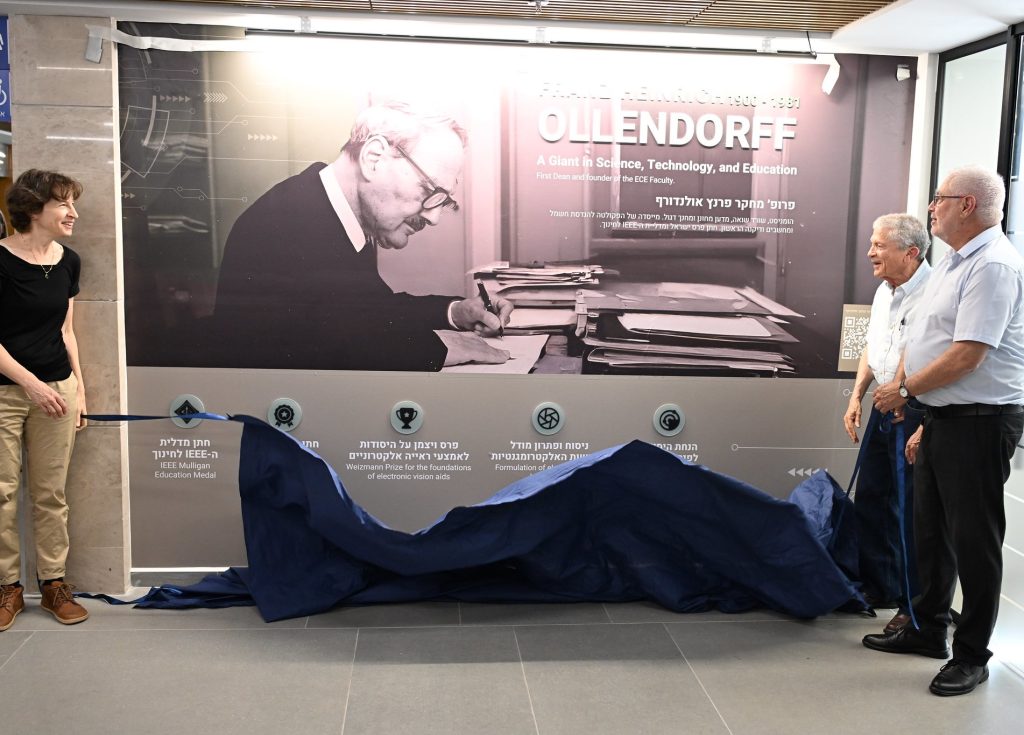Honoring Two Technion Pioneers
Memorial wall unveiled for Prof. Franz Ollendorff, alongside the annual Yitzhak Modai Memorial Lecture
The Technion inaugurated a memorial wall in honor of the late Prof. Franz Ollendorff, one of the founders of the Andrew and Erna Viterbi Faculty of Electrical and Computer Engineering, following the annual Yitzhak Modai Memorial Lecture on Technology and Economics
On July 8, the Technion held a festive event combining the annual Yitzhak Modai Memorial Lecture and the inauguration of a memorial wall for the late Prof. Franz Ollendorff.
Technion President Prof. Uri Sivan said: “Today we honor two exceptional individuals in the history of the Technion – figures who each, in their own way, made a significant impact on the State of Israel. While his colleagues fled from Germany to America, Prof. Franz Ollendorff chose to immigrate to the rocky land of Israel. It’s hard to imagine the contrast between Berlin, the global scientific center of the 1930s, and the Land of Israel at that time.
I remember Yitzhak Modai from my youth – he was a very impressive and visionary man. The State of Israel owes him a great debt, particularly for leading the country out of the deep economic crisis of the 1980s. Modai was a ‘Technion patriot’ who served as chairman of our alumni association and was deeply involved in the life of the Technion.”

Research Professor Franz Ollendorff
Prof. Franz (Haim) Ollendorff, founder of the department that became the Viterbi Faculty of Electrical and Computer Engineering, was born in Germany in 1900 and passed away in Israel in 1981. He studied engineering at the Technical University of Berlin and attended lectures by Max Planck and Albert Einstein at the Humboldt University of Berlin, where his academic and personal relationship with Einstein began. He worked at the University of Danzig, from which he was dismissed in 1924 due to antisemitism. Later, he became a lecturer at the University of Berlin but was fired in 1933 under the Nazi law restoring academic appointments to “pure” Germans. Ollendorff was persecuted not only for being Jewish but also for his efforts to rescue fellow Jews.
A true polymath, Prof. Ollendorff’s research spanned a wide range of subjects, including electromagnetism, radar, and the biophysics of vision and hearing – drawing on the theories of Einstein and other leading physicists. His work contributed significantly to the development of electron microscopy, a technology that magnifies microscopic objects by a factor of 10 billion, enabling the visualization of viruses, atomic structures, and more. According to Prof. Ido Kaminer of the Viterbi Faculty, “Ollendorff is one of the founding fathers of electron microscopy and was the first to apply Einstein’s theory of relativity to analyze the dynamics of free electrons in electromagnetic fields.”
Ollendorff received numerous awards and honors, including the Weizmann Prize, the Israel Prize in Exact Sciences, an honorary doctorate from the Technical University of Berlin, and honorary citizenship of Haifa. He was also awarded the IEEE Education Medal.
Ollendorff first visited the Technion in 1924, and in 1937, he joined the faculty. There, he founded the Department of Electrical Engineering, became its first dean, and gradually expanded its focus from traditional electrical engineering to electronics and many other emerging fields. He was the first person in Technion history to be appointed full professor and later became the institution’s first Distinguished Professor – the highest academic rank at the Technion.
The initiative to memorialize Ollendorff was led by Prof. Shuka Zeevi from the Viterbi Faculty, who stated: “Aharon Aharon and I were two of the ‘Ollendorff kids’ – his students first at BOSMAT, the Technion’s vocational high school, and later at the Technion. He deeply influenced every one of us and, of course, had a tremendous impact on the Technion and the State of Israel as a whole, based on his conviction that Israel’s future lay in science and technology. His joining the Technion was a milestone in the development of Israel’s scientific and technological infrastructure, laying the foundation for academic excellence that ultimately led Israel to become a hub of technological innovation and a ‘Startup Nation.’ Beyond his scientific and technological contributions, Ollendorff served as a role model in promoting humanistic values, creativity, and vision. That is his legacy. This year, we commemorate him in three ways: inaugurating the memorial wall, a short film marking the 125th anniversary of his birth, and a book detailing his life story and immense contributions to the Technion and to the State of Israel – a true giant in science, technology, and education.”
In Memory of Yitzhak Modai
Diplomat Boaz Modai, son of the late Yitzhak Modai, said: “My father was an honest and direct man – when he spoke, you knew he meant it. He left behind a distinguished legacy for us as a family and for all citizens of Israel. I thank the Technion for finding such a meaningful way to honor and remember him.”
This year’s Modai Lecture was delivered by Aharon Aharon, founder of C-perto, former CEO of the Israel Innovation Authority, and former CEO of Apple Israel. Aharon earned both his bachelor’s and master’s degrees from the Viterbi Faculty and began his career at IBM’s research labs. He later led multiple tech companies and startups, became Apple Israel’s first CEO, was a global VP of hardware technologies at Apple, and taught at the Technion for decades.
During his tenure at the Innovation Authority, Aharon positioned it as an effective and influential public body. In 2023, he received the Technion Alumni Medal for his many achievements that elevated the Technion, Israeli industry, and academia both locally and globally.
In his lecture titled “Generative AI – Opportunity or Threat to Academia?”, Aharon began by tracing the history of artificial intelligence, calling it the fifth industrial revolution, following:
- The mechanical revolution (18th century)
- The electrical revolution (20th century)
- The automation revolution (1970s)
- The digitization revolution (around 2000)
“This is the most dramatic revolution in terms of its impact on global GDP – it has already increased it by 14%. The market value of generative AI is currently estimated at $38 billion and is expected to surpass one trillion dollars by 2032. It attracts more investment than any other field.”
He added that while Israel stands out in the growing number of AI startups, it still has significant room for improvement in terms of scientific publications and national investment in the field. He emphasized: “Proper management of this field will accelerate scientific and technological research, improve teaching quality, and promote creative and critical thinking, personalized learning, and educational equity.
There is no doubt this field will reshape academia, and the Technion must adapt to this dramatic change. We must not fear it – we must embrace it.”
To watch the full film about Prof. Franz Ollendorff: From Vision to Legacy, click here>



